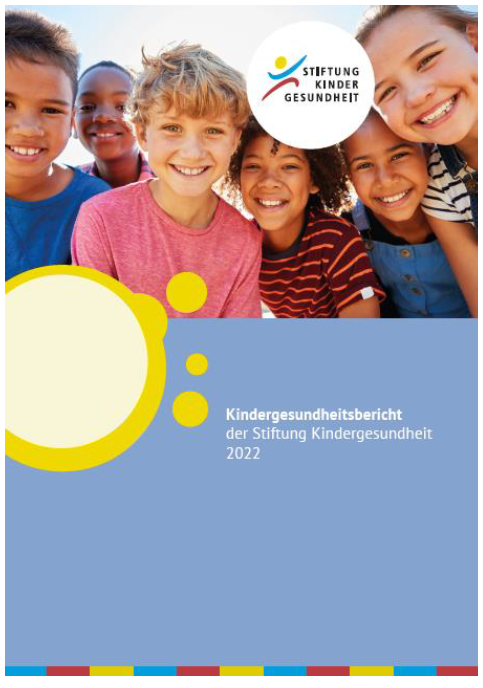Children’s Health Report: Germany violates children’s rights
Source : Stiftung Kinder GesundHeit
Summary
- 2022 Child Health Report
- The report
Berlin, September 20, 2022, Universal Children’s Day – In its first report on children’s health, the Children’s Health Foundation provides a mixed overview of children’s physical and mental health in Germany. Of particular concern is the fact that the social environment continues to have a strong influence on the health of children and young people. Climate change is becoming a growing threat.
“Every day in Germany the Convention on the Rights of the Child is violated. The priority of the child’s well-being, which is documented there, is too often ignored,” says Munich pediatrician and chairman of the foundation’s board of directors, Professor Berthold Koletzko. This is what the report presented, in some cases with striking clarity, shows. Despite generally good health opportunities, many children in Germany are denied the “highest attainable standard of health” enshrined in the United Nations Convention on the Rights of the Child, due to avoidable structural deficits.
- The Child Health Report 2022 covers a wide range of topics related to adolescent health in Germany. It ranges from perceptions of vaccines and screenings to the influence of socioeconomic factors and pandemic- and climate-related influences on their physical and mental health. In addition, the report also discusses general issues of the system structure and problems of pediatric care in Germany.
- In all the areas examined in the child health report, there is a considerable need for improvement. “Climate change, the pandemic, the war in Europe: children and young people are growing up in a time of diverse crises. This has a big effect on their health,” says Koletzko. The last few years of the pandemic have placed a lot of emphasis on children and young people. It has become clear that the well-being of the younger generations is not a priority in our society. “Children have the right to good health. The issue of children’s health must therefore be understood as an integral task of society as a whole. It must play a central role in all political decision-making processes. With this report, we want to start a concrete debate,” says Koletzko. The sponsors and co-publishers of the Children’s Health Report 2022 are the “Die Gesundarbeiter” Foundation, the lived health insurance company bkk, MSD Sharp & Dohme GmbH and Novartis Pharma GmbH.
2022 Child Health Report
Summary of key results
- Paediatrics: The financial and staffing situation of paediatric clinics and services in Germany is precarious in many areas. The DRG’s German lump-sum system for hospital remuneration does not reflect the rising personnel costs for the care of children and young people and the high upfront costs of paediatrics. In many places, it is difficult to guarantee child-friendly medical care.
- Climate Change: Climate-related diseases will increase significantly in the coming years. Environmental factors and climate change are causing, among other things, a significant increase in vector-borne diseases, infectious diseases, and climate-related mental and allergic diseases.
- Socioeconomic disparity: The socioeconomic status of parents influences the physical and psychological well-being of children and young people. The report’s evaluations show that the influence of social background has had a consistent and strong influence on children’s health over the past ten years, with no significant improvements. Socioeconomic inequalities have increased further in terms of eating habits and risk of obesity.
- Mental health: Teens’ stress levels remain at a high level years after the pandemic began. Depressive episodes and anxiety disorders occurred much more frequently than before the Corona period.
- Care: In the area of chronic and rare diseases, there is a clear fragmentation of the healthcare provision in Germany, poor quality and an overall insufficient supply. In many cases, the health system is unable to meet the needs of those affected.
- Detection: The German system of preventive medical examinations works well and has shown few weaknesses even during the pandemic. However, there is potential for optimisation in the area of exams for young people (D1 and D2).
- Immunization: When it comes to vaccinating children and adolescents, there are large gaps in vaccination for some vaccine-preventable infectious diseases. Vaccination rates of young people against human papillomavirus (HPV) are particularly unsatisfactory.
- Diet and exercise: Many children and adolescents continue to have poor eating habits and a severe lack of exercise. Time spent with digital media is increasing, while poor eating habits are common. Consumption of meat, sugar, sugary drinks, and fast food is clearly too high. The quality of food in schools and kindergartens is also often poor and does not meet the needs of younger generations.
The report

- The “Child Health Report” summarizes the most important data from various studies in recent years. It aims to serve as a central information base for the necessary health policy debate and to guide decision-makers.
- In addition to the collection of scientific data, the report aims to concretely identify possible solutions on the basis of a number of proposed measures. Each chapter contains recommendations for action. Other editions are planned.